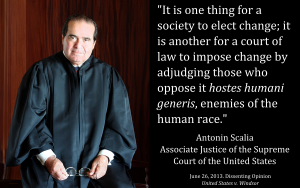 Last December U.S. District Judge Clark Waddoups issued a ruling effectively decriminalizing polygamy in Utah.
Last December U.S. District Judge Clark Waddoups issued a ruling effectively decriminalizing polygamy in Utah.
Under Utah law, a person may not file for more than one marriage license or cohabit with more than one “spouse.” The law is intended to prevent both state-recognized polygamy and the unofficial polygamy practiced by some people in which a man is legally married to one woman, but has other “wives” to which he is not legally married.
Kody Brown and his wives, stars of the reality TV show “Sister Wives” depicting their polygamous lifestyle, filed suit against the State of Utah over the law, and last December Judge Clark Waddoups struck the portion of the law preventing people from living together in polygamous relationships; Judge Waddoups did, however, leave the portion of the law preventing a person from filing for more than one marriage license. Since most polygamous groups do not typically file for multiple state marriage licenses anyway, this effectively decriminalizes polygamy in the State of Utah.
A stay was placed on Judge Waddoups’ initial ruling last year, pending a decision on whether or not Utah owed the Browns any financial compensation. This week, Judge Waddoups ruled the State of Utah must pay the Browns’ attorney fees, and put the full force of his December ruling into effect.
This ruling is significant, because the logic employed by Judge Waddoups decriminalizing polygamy is the very same logic being used to advance same-sex marriage around the country. Gay activists have long dismissed claims that same-sex marriage would lead to polygamy as “fear mongering.” However, Judge Waddoups’ ruling owes a lot to the U.S. Supreme Court’s Lawrence v. Texas ruling which has been used over and over again in court to argue against everything from the federal Defense of Marriage Act to state marriage amendments.
Judge Waddoups’ ruling largely hinges on the following:
- There is no rational basis for prohibiting plural relationships.
- Bans on plural relationships are intended to target “unpopular or disliked minority groups”–in this case, fundamentalist Mormons.
- That under Lawrence v. Texas, the state cannot prohibit these private relationships.
Not surprisingly, these are the very same arguments used in favor of same-sex marriage: That there is no rational basis for defining marriage as the union of one man to one woman; that any effort to do so is secretly motivated by “animus” (i.e. “hate”) for a disliked minority group; and that under Lawrence v. Texas, the government has very little power over private relationships.
In fact, Judge Waddoups went so far in his ruling as to claim Utah’s ban on polygamy was actually grounded in racism, because in the nineteenth century, polygamy was “a practice thought to be characteristic of Asiatic and African peoples who were believed, at the time, to be civilizationally and racially inferior.”
The problem is the ruling ignores a few key arguments:
- Same-sex marriage, polygamy, and any other alternative definition of “marriage” might be detrimental to society.
- Marriage is about more than the rights and privileges of adults; it is also about the rights and welfare of children.
- It has been demonstrated time and time again that the best place for a child is in a stable home with a married mother and father, and that children in any other type of home experience more negative consequences.
- Polygamy seems intrinsically tied to the subjugation of women and children.
- Because marriage and polygamy carry such significant consequences–particularly for children–it is reasonable to establish policies governing both.
Rather than address these arguments, Judge Waddoups does what the U.S. Supreme Court did in its Windsor decision striking part of the federal Defense of Marriage Act last year and what Judge Chris Piazza did when he struck Arkansas’ state marriage amendment a few months ago: He writes off the polygamy ban as motivated by animosity for an unpopular group of people, citing the very same arguments and cases as same-sex marriage advocates.
In 2013, U.S. Supreme Court Justice Antonin Scalia noted very eloquently that “it is one thing for a society to elect change; it is another for a court of law to impose change by adjudging those who oppose it hostes humani generis, enemies of the human race.”
To say same-sex marriage opens the door for polygamy is not “fear mongering.” If anything, it is a fact.


